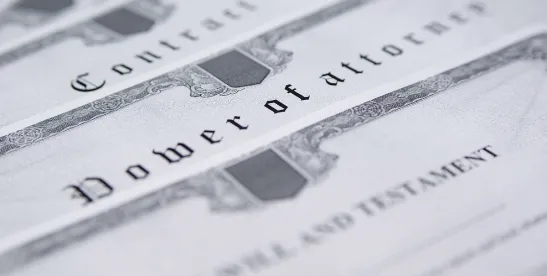The Uniform Power of Attorney Act (“UPOAA”) was signed into law by Michigan Governor Gretchen Whitmer on November 7, 2023. Taking effect on July 1, 2024, the UPOAA repeals and replaces the durable power of attorney provisions in the Estates and Protected Individuals Code (“EPIC”), MCL 700.5501-5505. Michigan now joins 30 other states and the District of Columbia in adopting a version of this unified framework.
In general, the UPOAA provides significantly more guidance on the procedures, powers and limitations applicable to financial powers of attorneys in Michigan. The UPOAA contains 47 separate statutes all relating to financial powers of attorney, whereas EPIC only contained five.
The following are some of the more pertinent provisions contained in the UPOAA:
- A power of attorney executed in Michigan prior to July 1, 2024, will remain valid provided that it was signed in accordance with the laws in existence at the time of execution.
- A power of attorney created after July 1, 2024, that is executed in accordance with the UPOAA is deemed to be “durable” unless it expressly provides that it is terminated by the incapacity of the principal.
- “Springing” powers of attorney are expressly permitted. A “springing” power of attorney becomes effective upon the disability of the principal or future date.
- The UPOAA makes clear that a power of attorney terminates at death.
- A principal may designate more than one coagent and each coagent may act independently, unless the power of attorney provides otherwise. Additionally, a principal may grant his or her agent the right to designate successor agents.
- A principal may relieve an agent from liability under a power of attorney, absent bad faith or reckless indifference.
- An agent that embezzles from a principal while acting under a power of attorney is liable for treble the value of the property embezzled.
- When presented with a valid power of attorney, financial institutions (and others) may not require the principal to sign an additional power of attorney on their forms.
- If provided expressly in the power of attorney, an agent may, on behalf of the principal, create, amend, revoke or terminate an inter vivos trust, make a gift, change rights of survivorship and change a beneficiary designation.
- The UPOAA provides a statutory form of power of attorney.
- If an individual executes a power of attorney in another state it will be valid in Michigan if the power of attorney was executed in compliance with the laws of the state where the individual was domiciled at the time of execution.
- The UPOAA does not apply to Patient Advocate Designations. Patient Advocate Designations are sometimes referred to as “Powers of Attorney for Health Care.” The UPOAA specifically exempted Patient Advocate Designations from this legislation.
While the statutory form allows for easier access to creating a power of attorney, it is still important to consult with legal counsel when preparing this form because of the significant authority granted to an agent under a power of attorney.





 />i
/>i

